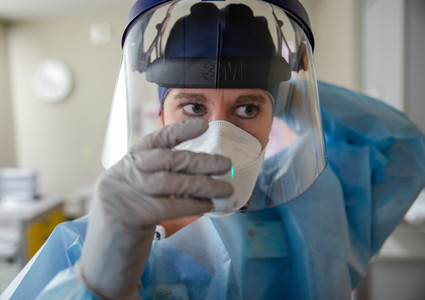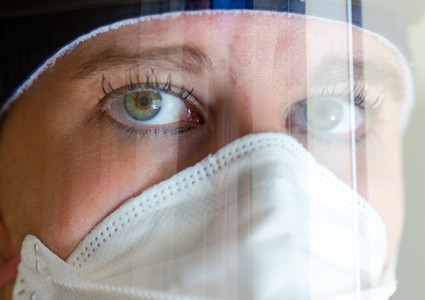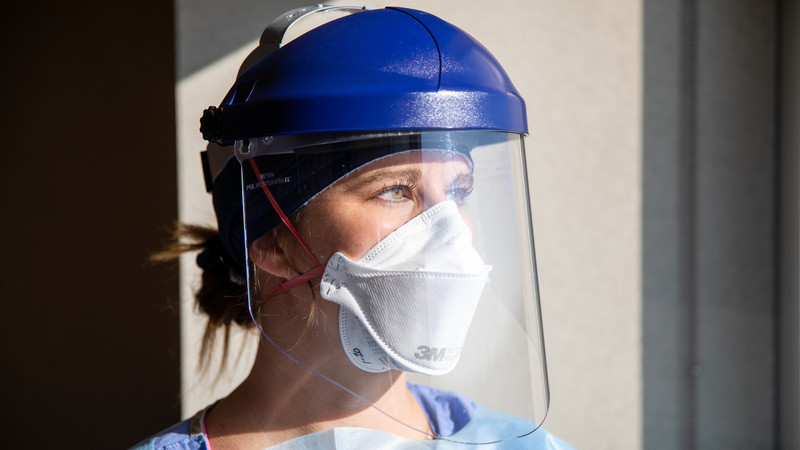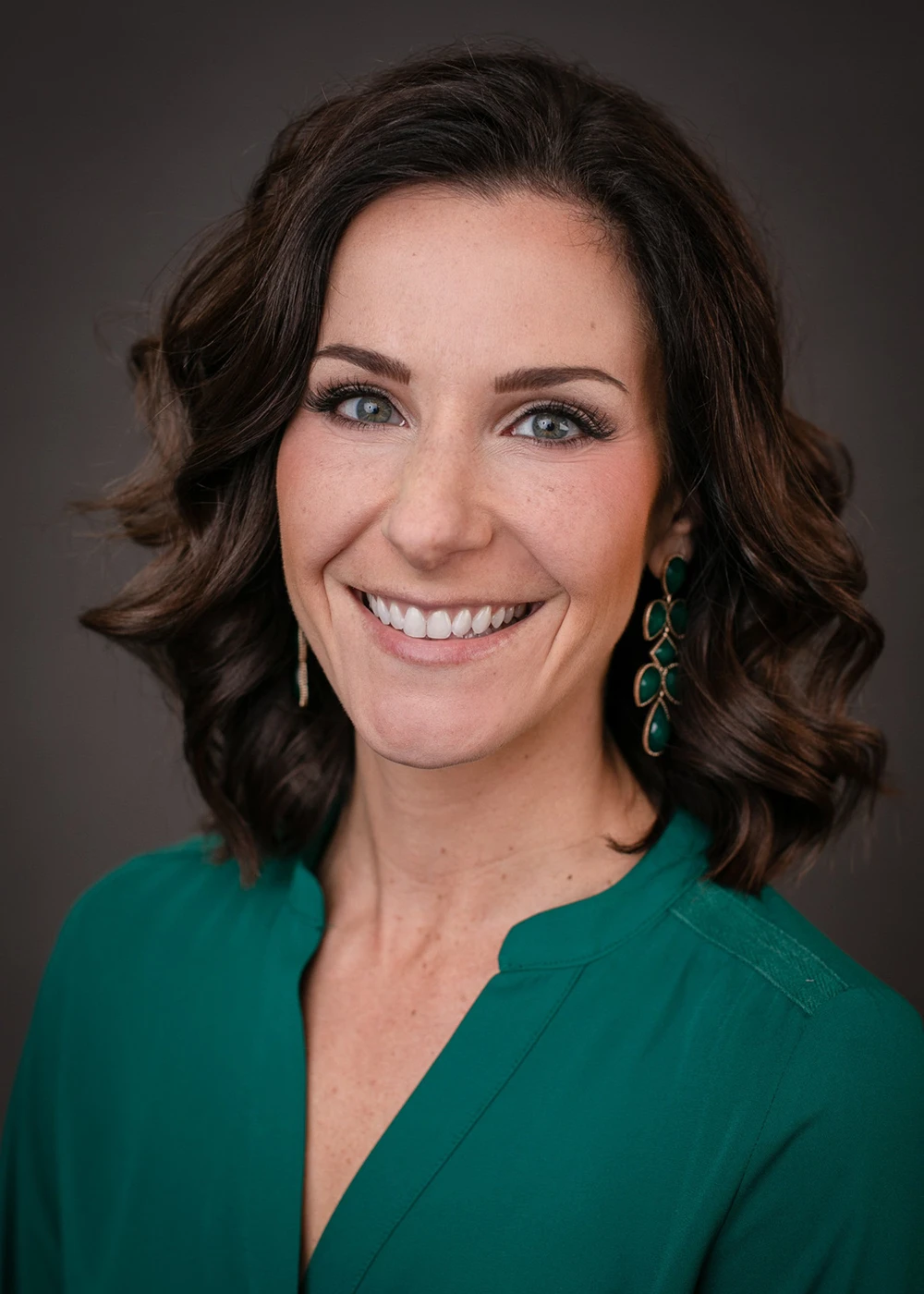




The Meaning of Care Magazine
Nursing on the Front Lines: A Day in the Life of a COVID-19 Warrior
Published: Nov. 20, 2020“You just never know when you’re going to be able to eat again,” she said.
She chats with her almost 3-year-old, Ella.
“I tell her, ‘Mommy has to go to work and help sick people.’ She’s always very sweet about it,” Charvat said.
These days, not everyone is. These days, people tend to steer clear of Charvat after learning of her profession – caring for patients with COVID-19.
She forces a smile as she drops Ella off with a grandparent. She calls her boyfriend for one last dose of support and encouragement before returning to a job that’s wearing on her mind, body and heart.
Day-to-Day Highs and Lows
Her 9 a.m. shift starts abruptly. She changes into scrubs and grabs her N95 mask.

While she never knows what the next minute will bring, she always knows how the day will unfold.
“I can’t explain it,” she said. “I don’t know what it is about being a nurse, but there’s just this intuition.”
She knows whether she’ll get through the day sans tears or if she’ll be choking them back as she’s trying to catch her breath, running from room to room.
“The best example of that is when I was caring for a patient who was placed on a BiPAP machine, which supplements oxygen. She was confused and kept trying to pull her mask off. And sometimes, she’d succeed. I’d have 10 seconds to get in there before her oxygen saturations were in the 50s. And these patients can’t feel it. They can’t feel their saturations drop to these deadly levels.”
Every day, she prays that time is on her side.
“I rarely feel comfortable going to the bathroom or eating a snack. There’s this constant, ‘OK, if I’m in this patient’s room, is my other patient crashing?’ You just hope that another nurse – who’s just as busy as you are – is around to hear the alarm and can get there in time. But having to gown, glove and put on your face shield – the timing of it all. It’s just scary.”
Yet somehow, even if temporarily, the scary gets replaced with a sense of peace.
“Like when our chaplain, Crystall Williams, comes to our unit and has a daily prayer. When it feels like we’re losing all control, that simple act serves as reminder: We’ve never actually been in control.”
The roller coaster of emotions Charvat experiences in a day is always accompanied by the hot, sticky sensation brought on by multiple pieces of personal protective equipment (PPE). Sometimes, she needs to excuse herself from the room of a patient who wants to tell her about their family, their job or their life in general.
“It’s rough – having to apologize for needing a break from this gear when they finally feel well enough to open up to you.”
She’d spend 24 hours a day in full PPE, though, if it meant she never had to call another family to discuss end-of-life care.
“I mean, how does a family decide whether to withdraw care without physically laying eyes on their loved one – seeing their labored breathing and hearing the awful sounds coming from their lungs? You can’t see or hear those things over FaceTime. You can’t hug them, hold them or kiss them over FaceTime, either.”
So, what keeps her going? The brief moments of light that seem to shine through when they’re needed the most.
“I was assisting with the admission of an older woman who was too weak from COVID-19 to care for herself at home. As I was putting on her blood pressure cuff, I noticed how clammy she was. She told me she hadn’t been able to bathe for a week. I asked for help in gathering supplies for a bed bath. And as soon as I put that warm washcloth on her face, her whole body seemed to breathe a sigh of relief. She said, ‘Oh, that feels so good.’ And we all know what that feels like, right? To wash the day off your face before climbing into bed? It was just – to be able to provide that feeling during a time when we all felt like what we were doing was never enough – that was huge.”
An Illness That “Stays With You”
When Charvat arrives home after a 10-plus hour shift, she leaves her shoes in the garage. She strips her clothes in the laundry room and starts the washing machine. She heads upstairs to shower. Her tired legs then shuffle to bed. She’s exhausted from the day, but she can’t stop thinking about her patients.
“Like that woman on BiPAP – I still think about her,” she said. “I wonder where she is – how she is. There’s just something about COVID-19 and the effects it has on people that stays with you more than any other illness.”
She avoids looking at Facebook before calling it a night. She knows better.
“Because when you see people complaining about wearing a mask, it hurts,” she said. “It’s like an extra dagger in your heart that’s already broken over the patients you’re trying to save.”
“Uniquely Positioned” for the Front Lines
Charvat has come a long way since the days of feeling like a “pariah” among her

her COVID-19 team.
family and friends. She doesn’t change the subject when asked what she does for a living. And she spends a lot of her time advocating for nurses and educating her peers.
“There’s a stigma attached to you when you tell people you care for COVID-positive patients,” said Heather Rolling, MSN, NE-BC, PCCN, Methodist Hospital’s PCU service leader. “Emily quickly learned to brush it off and has continued to lead from the bedside during all this.”
According to Charvat, though, her fellow PCU nurses have never needed much leadership – not even during this pandemic.
“Because of the work we do with respiratory illnesses and infectious diseases, we all had a hunch that we’d be the ones receiving these patients,” Charvat said. “But we were uniquely positioned to do so. At any given time, we know what’s going on around us and with our other nurses. We know when to lend a hand and when to ask for help.”
The teamwork her unit has shown amid the day-to-day highs and lows that come with caring for COVID-positive patients is truly noteworthy, Charvat said.
“Not everyone sees what we see,” she said. “And they never will. And that’s OK.”

What matters, she said, is winning this fight, and it’s going to take an “all-in approach.” So, she’ll swallow the shunning and make another big breakfast. With a team of warriors by her side, she’ll continue standing guard on the front line she was called to.
Photos and video by Daniel Johnson
More Resources
- Read about the CDC’s recommendations for safe holiday celebrations.
- Learn the difference between a cold, the flu and COVID-19.
- Get similar articles delivered straight to your inbox.


